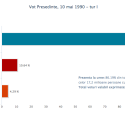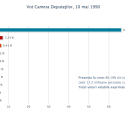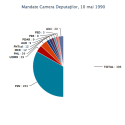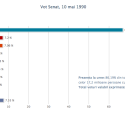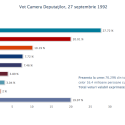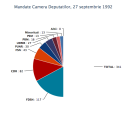IMPORTANT DEVELOPMENTS
- 1. POLITICS. The budget for 2014 will provide more funding for Education and Health and will stimulate investment-based economic growth.
- 2. FOREIGN POLICY. The Chinese Prime minister’s visit to Romania concludes a year in which Romania has come out of the isolation it had been in in recent years.
- 3. ADMINISTRATION. The Government will assume responsibility for the decentralization law.
- 4. PARLIAMENT. The Senate sets up a commission to investigate the real-estate transactions in Calarasi County.
1. The budget for 2014 will provide more funding for Education and Health and will stimulate investment-based economic growth.
Before discussing the 2014 budget in Parliament, Government officials have stressed that the budget will not include taxes for the Romanian good-payers, but for exempted and privileged companies and people.
Health budget will equal 30 billion. The Ministry of Health has received 2.5 billion lei more than in 2013, from 5.2 billion to 7.8 billion. CNAS has a budget of 22.6 billion lei, up from 22.5 billion in 2013. The budget also provides for a monthly tax-free grant of 150 euros for doctors and resident pharmacists.
Education budget allocations are also increasing: 300 million euros of EU funds will be reallocated from other programs for works in school infrastructure. The salaries of junior teachers will increased by 10% in secondary school education (with more than 6 years of experience); and by 10% the wages of tutors and assistant professors. The subsidies for student housing will be up by 10%. In addition, in 2014, the state will pay 2.06 billion lei in enforceable wages, of which 1.06 billion for secondary school and university (the equivalent of a 10% increase in salary, average on the whole system), government officials stressed.
Government representatives indicated that the investment-based growth will be stimulated by increasing public investment, especially increasing the co-financing with European funds. The business environment will be stimulated by state guarantee schemes and state aid (especially SME guarantee scheme).
Government officials said that the Government is considering reducing the CAS, from the second half of 2014, while stressing that the VAT on bread remains low and that there are preparations for the reduction of in other product categories.
At the level of social protection measures, the new budget provides for increasing the minimum wage by 12.5%, increase pensions by 3.76%, together with revenue growth of 5% minimum guaranteed.
Government representatives have emphasized that it is not pursuing charges and tax increases for most the majority of taxpayers, but expanding the tax base. However, they underlined that Romania has the lowest tax burden in the EU, not because we have the lowest, but we have many Romanians who do not pay the same as others).
USL officials also criticized Basescu’s decision to keep the budget, considering that the opposition towards the salaries’ increase in Education and Healthcare is irresponsible.
2. The Chinese Prime minister’s visit to Romania concludes a year in which Romania has come out of the isolation it had been in in recent years
Next week, a very important political and economic event will be held in Bucharest – the official visit of the Chinese PM, who will come together with an impressive delegation of officials and businessmen. The visit has an important political dimension, in terms of receiving China’s Prime Minister in Bucharest, but also an economic one (in terms of the Economic Forum, one of the most important economic events organized in recent years in Romania).
Government officials have expressed satisfaction with the event, considering that it puts Romania on the world map, and shows how Romania is viewed by China and by partners in Central and Eastern Europe. They pointed out that the scale of the events is impressive and that they happily end a year in which Romania has come out of the isolation in which it had been in recent years.
The Chinese PM’s visit is a response to the invitation of Prime Minister Victor Ponta, a testimonial to the success of his recent visit to China, being the first visit of a Chinese PM in 19 years. China’s Prime Minister will be accompanied by an important official delegation (finance, foreign, trade, development ministers) and by business people representing 200 companies. It will be the largest Chinese official delegation visiting Central and Eastern Europe.
During the visit, a number of documents will be signed: A policy statement of cooperation between the two Governments and several agreements / motivation letters in energy, culture, veterinary field, and a number of commercial contracts.
At the meeting of the Prime Ministers of Central and Eastern Europe – China (Tuesday, November 26), 17 Prime Ministers (16 +1) will be present. The meeting, second only to the one in Warsaw in 2012, is a testimonial of the role played by Romania. The meeting aims at assessing the state of implementation of the 12 proposals to promote cooperation between CEE countries and China, established in Warsaw, and the identifying new cooperation projects in areas such as energy, agriculture, infrastructure, ICT and tourism.
3. The Government will assume responsibility for the decentralization law
Government officials stressed that it is the first time in the history of Romania after 1989 when a Prime Minister and a Government want to give powers to local authorities and not take from their duties. Government representatives also stressed that there are alternatives to this project for development in local communities. The local authorities have the unquestionable legitimacy of direct vote.
USL representatives also reiterated that decentralization is a process that involves also, in fact, sharing of the real power. For example, the central power belongs now exclusively to USL, but in the territory there are CJ presidents and mayors who belong to other parties, criticizing the position adopted by PDL.
USL leaders also stressed that decentralization was desired by all Romanian political forces, it is only implemented by the USL. Decisions that normally are taken in local Governments are now part of the larger discussion. USL leaders have also shown that the allegation from tonight is absurd, and that decentralization is done in favor of the Union. Strengthening the local Government’s position is not bound to the new political color, and the political and policy configuration, locally, will not always be the same.
4. The Senate sets up a commission to investigate the real-estate transactions in Calarasi County
USL MP Leaders welcomed the publication of the contract according to which Ioana Basescu has purchased nearly 300 acres in the county of Calarasi. Ioana Basescu, the daughter of President Traian Basescu, got, on September 9, 2013, of U.S. $ 4.6 million (over 1 million Euros) credit from CEC Bank, in order to buy a 290 hectares plot in Calarasi County. CEC Bank is a bank with state capital running. These kind of important credits Awarded to natural persons is rare in Romania. Moreover, from CEC Bank’s official offer, the maximum level for such a loan is U.S. $ 2.8 million (less than 600,000 Euros), so lower than the value of the credit given to the President’s daughter.
President Traian Basescu had declared that the initiative of taking this loan was his. Given to the low level of his income, the president supposedly could not get the loan, so his daughter Ioana bought the aforementioned plot of agricultural land. Moreover, Traian Basescu has declared that he wishes “that in a short time, he will take over the credit on his own name”. The president did not mention how he will gain any additional income gain after leaving his current public position.
The Romanian President, Traian Basescu, phoned the Finance Minister and asked the minister to avoid dismissing the president of CEC Bank before the ending of his term, even though the financial institution is undergoing a process of evaluation.
USL politicians showed that public interest is not directed at the persons of Ioana Basescu, but to the extent to which state institutions have been engaged to facilitate the granting of preferential housing credit and facilitate the buy-sell process.
The Commission will check also the manner in which several transactions in the region have been carried out.



